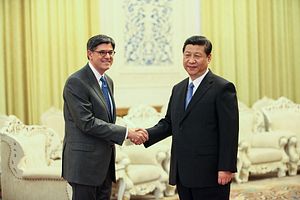U.S. Treasury Secretary Jacob Lew wrapped up a two-day visit to Beijing Tuesday, during which U.S. concerns about access to Chinese markets were on full display. The U.S. has been vocal about its disapproval for new information security rules and a draft anti-terrorism law, both of which could force foreign companies to either give the Chinese government access to sensitive data or be forced out of China altogether.
During his visit, Lew was particularly concerned about the information security rules set to take effect in the banking sector. Those regulations would require banks to prove that their information technology is “secure and controllable” – which could require foreign firms to disclose source code to Chinese government overseers. The new rules are part of a larger push for China to rid key sectors (including banking) of reliance on foreign technology by 2020.
Lew, in remarks before meeting with Vice Premier Wang Yang, made it clear the issue was high on his agenda. “We have already made clear our concerns regarding forced technology transfer and other attempts to bar technological competition, most recently in the banking sector,” Lew said. “I look forward to further discussion today.”
A senior U.S. Treasury Department official traveling with Lew told reporters that the secretary did in fact emphasize the issue during his talks with Chinese officials. In response, Beijing agreed to delay the implementation of the law, but did not definitively change its stance, the Wall Street Journal reported. Under the original plan, banks were required to begin implementing plans to comply with the rules on April 1. It’s unclear how long Beijing plans to delay implementation.
Lew also told Wang that U.S. officials “look forward to working with China as it … becomes more integrated into and assumes greater responsibility in the global financial system.” The U.S. strongly opposed China’s attempt to set up a new multilateral financing mechanism, the Asian Infrastructure Investment Bank (AIIB), arguing that it would under-cut existing mechanisms. The Treasury Department official traveling with Lew said the secretary has urged Beijing to have the AIIB work alongside existing institutions, rather than seeking to supplant them. The official also said the U.S. is not currently considering joining the AIIB.
However, China argue back that the U.S. hasn’t allowed it to “assume greater responsibility” in existing organizations, such as the World Bank and the International Monetary Fund. U.S. and Chinese observers alike believe that lack of reforms in existing international financial institutions such as the IMF was a driving factor in China’s decision to found the AIIB.
During a meeting with Lew, Premier Li Keqiang urged the U.S. to pass IMF reforms. In particular, China wants to have a larger share of voting rights in the organization. According to Li, China also wants its currency, the renminbi (RMB), to be included in the basket of currencies that determine the value of special drawing rights (SDR), an international reserve asset created by the IMF. The SDR’s basket currently consists of the euro, the yen, the pound sterling and the U.S. dollar.

































